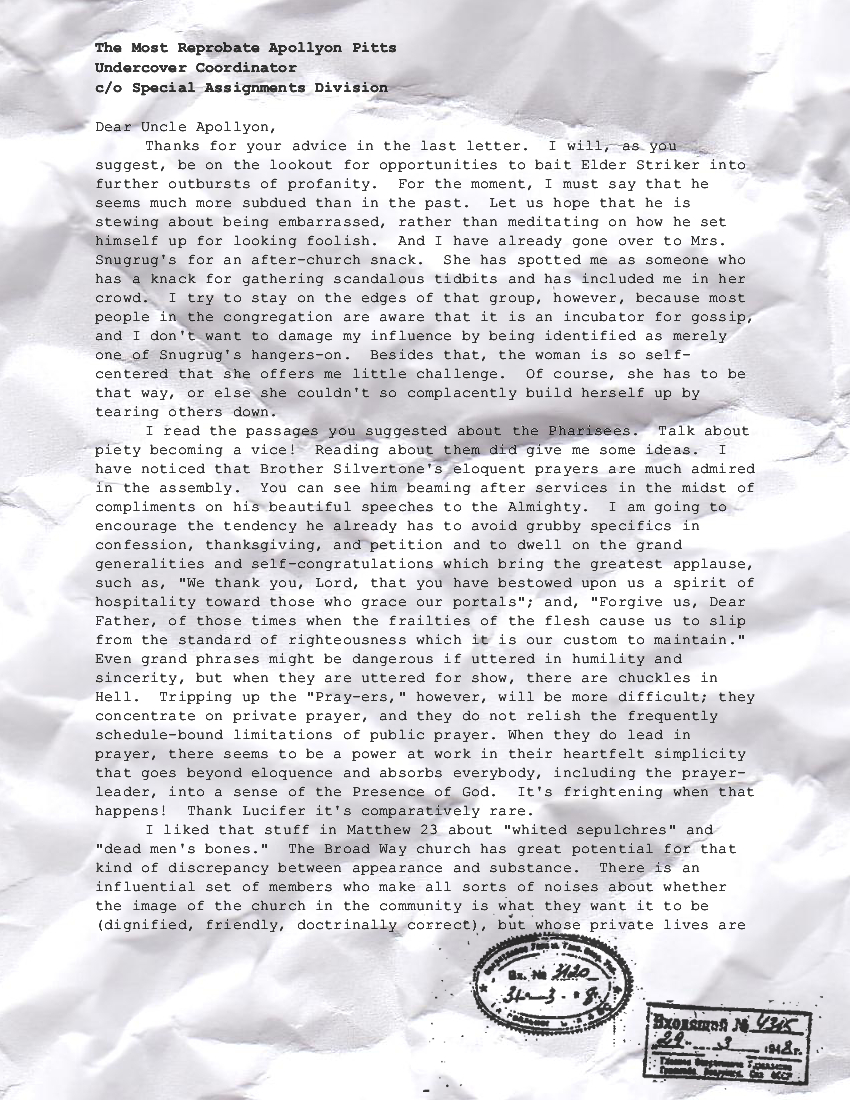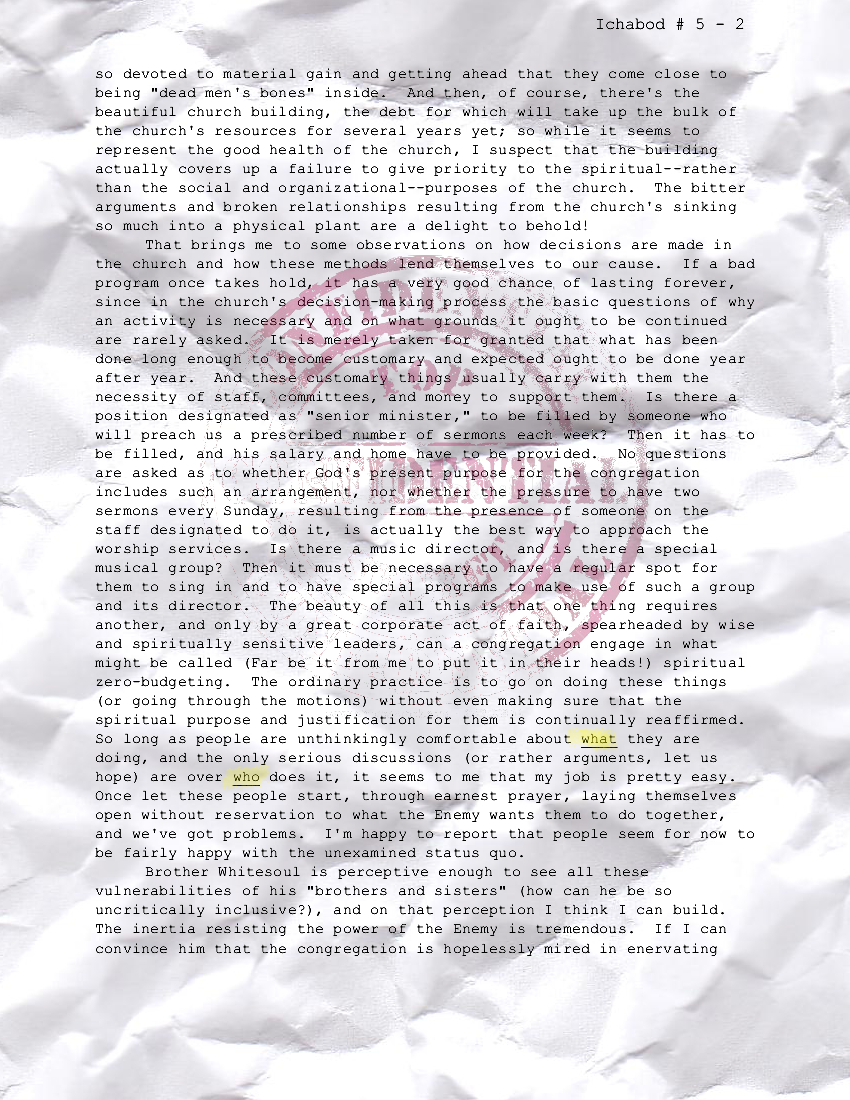Leaked Documents: Ichabod to Apollyon (Letter #5)
/Editor’s Note: Administering a website like this occasionally makes editors privy to some exotic and intriguing correspondence. In light of the particularly dark nature of some letters we have stumbled upon—we can’t reveal exactly how—we thought it our duty to share this series of missives. We appear to be in possession of only one side of the exchange of letters—from a nephew to his uncle. The nephew’s name is Ichabod and his uncle’s name Apollyon, who seems to be in an advisory position of some sort. It’s not our intent to demonize anyone by divulging what we have seen, but we feel we are performing an important service by bringing this devilishly cunning correspondence to light. Here is the fifth letter we were given.



Transcription:
Dear Uncle Apollyon,
Thanks for your advice in the last letter. I will, as you suggest, be on the lookout for opportunities to bait Elder Striker into further outbursts of profanity. For the moment, I must say that he seems much more subdued than in the past. Let us hope that he is stewing about being embarrassed, rather than meditating on how he set himself up for looking foolish. And I have already gone over to Mrs. Snugrug's for an after-church snack. She has spotted me as someone who has a knack for gathering scandalous tidbits and has included me in her crowd. I try to stay on the edges of that group, however, because most people in the congregation are aware that it is an incubator for gossip, and I don't want to damage my influence by being identified as merely one of Snugrug's hangers-on. Besides that, the woman is so self-centered that she offers me little challenge. Of course, she has to be that way, or else she couldn't so complacently build herself up by tearing others down.
I read the passages you suggested about the Pharisees. Talk about piety becoming a vice! Reading about them did give me some ideas. I have noticed that Brother Silvertone's eloquent prayers are much admired in the assembly. You can see him beaming after services in the midst of compliments on his beautiful speeches to the Almighty. I am going to encourage the tendency he already has to avoid grubby specifics in confession, thanksgiving, and petition and to dwell on the grand generalities and self-congratulations which bring the greatest applause, such as, "We thank you, Lord, that you have bestowed upon us a spirit of hospitality toward those who grace our portals"; and, "Forgive us, Dear Father, of those times when the frailties of the flesh cause us to slip from the standard of righteousness which it is our custom to maintain." Even grand phrases might be dangerous if uttered in humility and sincerity, but when they are uttered for show, there are chuckles in Hell. Tripping up the "Pray-ers," however, will be more difficult; they concentrate on private prayer, and they do not relish the frequently schedule-bound limitations of public prayer. When they do lead in prayer, there seems to be a power at work in their heartfelt simplicity that goes beyond eloquence and absorbs everybody, including the prayer-leader, into a sense of the Presence of God. It's frightening when that happens! Thank Lucifer it's comparatively rare.
I liked that stuff in Matthew 23 about "whited sepulchres" and "dead men's bones." The Broad Way church has great potential for that kind of discrepancy between appearance and substance. There is an influential set of members who make all sorts of noises about whether the image of the church in the community is what they want it to be (dignified, friendly, doctrinally correct), but whose private lives are so devoted to material gain and getting ahead that they come close to being "dead men's bones" inside. And then, of course, there's the beautiful church building, the debt for which will take up the bulk of the church's resources for several years yet; so while it seems to represent the good health of the church, I suspect that the building actually covers up a failure to give priority to the spiritual--rather than the social and organizational--purposes of the church. The bitter arguments and broken relationships resulting from the church's sinking so much into a physical plant are a delight to behold!
That brings me to some observations on how decisions are made in the church and how these methods lend themselves to our cause. If a bad program once takes hold, it has a very good chance of lasting forever, since in the church's decision-making process the basic questions of why an activity is necessary and on what grounds it ought to be continued are rarely asked. It is merely taken for granted that what has been done long enough to become customary and expected ought to be done year after year. And these customary things usually carry with them the necessity of staff, committees, and money to support them. Is there a position designated as "senior minister," to be filled by someone who will preach us a prescribed number of sermons each week? Then it has to be filled, and his salary and home have to be provided. No questions are asked as to whether God's present purpose for the congregation includes such an arrangement, nor whether the pressure to have two sermons every Sunday, resulting from the presence of someone on the staff designated to do it, is actually the best way to approach the worship services. Is there a music director, and is there a special musical group? Then it must be necessary to have a regular spot for them to sing in and to have special programs to make use of such a group and its director. The beauty of all this is that one thing requires another, and only by a great corporate act of faith, spearheaded by wise and spiritually sensitive leaders, can a congregation engage in what might be called (Far be it from me to put it in their heads!) spiritual zero-budgeting. The ordinary practice is to go on doing these things (or going through the motions) without even making sure that the spiritual purpose and justification for them is continually reaffirmed. So long as people are unthinkingly comfortable about what they are doing, and the only serious discussions (or rather arguments, let us hope) are over who does it, it seems to me that my job is pretty easy. Once let these people start, through earnest prayer, laying themselves open without reservation to what the Enemy wants them to do together, and we've got problems. I'm happy to report that people seem for now to be fairly happy with the unexamined status quo.
Brother Whitesoul is perceptive enough to see all these vulnerabilities of his "brothers and sisters" (how can he be so uncritically inclusive?), and on that perception I think I can build. The inertia resisting the power of the Enemy is tremendous. If I can convince him that the congregation is hopelessly mired in enervating mediocrity, perhaps he will give up, or even lose his faith. (In his case, I wish that the church would decide it doesn't need a minister.) He must be getting unfair help from the Enemy, or he wouldn't have held on this long.
So you see that I have many good (should I say "bad"?) opportunities here at Broad Way for promoting hypocrisy, disillusionment, and complacency. What more could a devil ask?
Yours for eternal hate,
Ichabod
Photo: "Royal Typewriter" By A. Myer. CC License.

